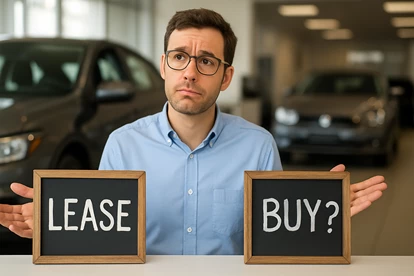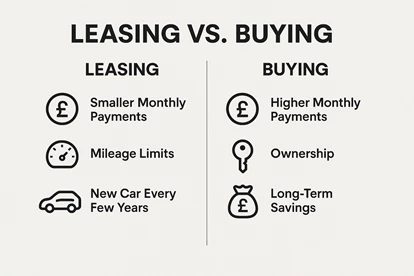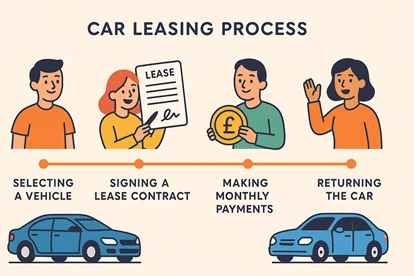Unsure whether to purchase or lease your next vehicle? This article will break down the key differences, costs, and benefits of vehicle purchase vs lease, providing you with the information you need to make an informed choice. Dive in to discover which option suits your financial situation and lifestyle better.

Key Takeaways
-
Leasing offers lower monthly payments and allows access to new vehicles every few years, making it a cost-effective choice for budget-conscious consumers.
-
Car ownership provides full ownership, no mileage restrictions, and the ability to modify the vehicle, offering greater flexibility compared to leasing.
-
Deciding between leasing and buying should be based on individual financial situations and preferences, such as the desire for new cars or long-term ownership.
Understanding Car Leasing
Car leasing is akin to a long-term rental agreement, allowing you to drive a lease vehicle for a specified period without the burden of ownership. When you lease a car, you typically make an initial deposit followed by fixed monthly payments for the duration of the lease. This arrangement makes leasing an attractive option for those who prefer lower monthly payments and the ability to drive a new car every few years. Understanding how car leasing work can help you make informed decisions about your lease car options.
The lease agreements are structured to cover an agreed period, usually ranging from two to four years. These contracts outline the terms, including mileage limits, maintenance responsibilities, and the conditions under which the vehicle must be returned. At the end of the lease term, the car is returned to the leasing company, and you can choose to lease a new vehicle, purchase the leased car, or simply walk away.
Leasing a car can be a cost-effective way to enjoy the benefits of a new vehicle without the long-term commitment of ownership. However, it’s important to understand the specifics of how car leasing works before making a decision. Let’s explore the key benefits of leasing a car.
Key Benefits of Leasing a Car
Leasing a car comes with several attractive benefits, including lower monthly payments, access to new cars frequently, and avoiding depreciation. These lease deals make leasing an appealing option for many drivers.
Next, let’s dive deeper into each of these benefits to paint a clearer picture of why leasing might be the right choice for you.

Lower Monthly Payments
One of the primary advantages of car leasing is the lower monthly payments compared to purchasing a car outright. When you lease a vehicle, you typically pay an initial sum followed by fixed monthly payments, which are often significantly lower than those associated with car loans. This is because lease payments are based on the vehicle’s depreciation during the lease period rather than its full purchase price.
Leasing can be a more affordable option in the short term due to its lower monthly payment structure. For many, this means being able to drive a nicer or newer vehicle than they could afford if they were buying. Additionally, the lower monthly payments free up funds for other expenses or savings, making it an appealing choice for budget-conscious consumers, especially when considering the potential for higher monthly payments if one opts to buy instead.
Access to New Cars Frequently
Leasing a car allows you to drive a new vehicle every few years without the hassles of ownership. Typically, lease terms last between two to five years, and at the end of the lease, you can return the vehicle and lease a new one. This constant access to new cars means you can always drive the latest models with the newest technology and safety features.
This frequent access to new vehicles is a significant advantage for those who enjoy the experience of driving different makes and models. Moreover, transitioning to a new car at the end of a lease is usually a smooth process, managed by the leasing company, which handles the return and setup of your next vehicle.
Avoiding Depreciation
One of the less obvious but highly beneficial aspects of car leasing is avoiding the financial burden of vehicle depreciation. When you lease a car, you are not responsible for its long-term value, which means you don’t have to worry about how much the car will depreciate over time.
This lack of depreciation worries can be a significant financial relief, especially considering how quickly new cars lose value. By leasing, you only pay for the vehicle’s use during the lease period, thus sidestepping the long-term depreciation and potential resale value concerns that car owners must contend with when they decide to sell or trade in their vehicle.

Important Considerations When Leasing
While leasing a car has its benefits, it’s also important to consider certain factors to ensure it’s the right decision for you. Mileage limits, maintenance responsibilities, and early termination fees are critical aspects that can affect your leasing experience.
In the following subsections, we will explore these considerations in detail to help you navigate the potential pitfalls of leasing a car.
Mileage Limits
Leasing contracts usually come with fixed mileage limits, typically ranging from 5,000 to 20,000 miles per year. If you exceed these mileage limits, you will incur additional charges at the end of the lease term. These extra costs are calculated based on the excess miles driven and can add up quickly if you’re not careful.
Accurately estimating your annual mileage before signing a lease agreement can help you avoid these penalties. Consider negotiating higher mileage limits if necessary. Discussing your driving habits with the leasing company beforehand can help you find a suitable lease deal, especially if you have an agreed mileage.
Maintenance Responsibilities
Under a leasing agreement, the leased vehicle remains the property of the leasing company, but the lessee is responsible for its maintenance. This includes regular servicing and keeping the vehicle in good condition to avoid additional charges at the end of the lease term. While leasing often includes manufacturer’s warranty coverage, any repair costs outside of this warranty can fall on the lessee.
Optional maintenance package can be added to the lease agreement to cover a range of services for additional costs. These packages can provide peace of mind by covering routine maintenance and unexpected repairs, making it easier to keep the vehicle in excellent condition throughout the lease term.
Early Termination Fees
Ending a lease agreement early typically incurs significant fees based on the outstanding balance of the lease. These fees can sometimes require payment of remaining monthly rental payments, making early termination an expensive option. For instance, if your lease payment is £300 per month and you have one year left, the early termination fee could be as high as £1,800.
Reviewing the lease contract thoroughly before signing can help you avoid these full cost and understand all potential fees associated with early termination. Considering your long-term needs and planning ahead can help you avoid the financial burden of breaking a lease contract prematurely.
Understanding Car Buying
Buying a car involves acquiring full ownership of the vehicle, allowing you to keep it as long as you desire and potentially resell it in the future. Whether you choose to buy a car outright or finance the purchase, owning a vehicle offers a sense of permanence and freedom that leasing cannot match.
Purchasing a car outright enables immediate ownership without any ongoing financial commitments or interest charges. However, if you choose to finance the purchase, you do not own the car until the final payment is made, and missing payments can result in the lender reclaiming the vehicle.
One of the significant benefits of buying a car is the ability to build equity over time, which can provide financial advantages as you make payments. Full ownership also means no mileage restrictions or limitations on vehicle condition, giving you the freedom to drive as much as you want and maintain the car as you see fit.
Key Benefits of Buying a Car
Buying a car offers several advantages, including full ownership, no mileage restrictions, and the ability to modify the vehicle. These benefits provide a level of freedom and flexibility that leasing cannot match, especially when considering a brand new car.
Let’s explore these benefits in more detail.
Full Ownership
When you own your vehicle, you have the flexibility to decide its fate, whether to sell, trade, or keep it. Full ownership allows you to keep the car as long as you desire, without any ongoing payments, giving you complete control over your vehicle.
Additionally, unlike leasing, owning a car means you are building equity with each payment, which can be a significant financial advantage.
No Mileage Restrictions
Car ownership means you can prefer driving as much as you want without worrying about exceeding mileage limits that typically come with leases for an extended period. This freedom to drive without restraints allows for greater usage flexibility and can enhance the overall driving experience.
Leasing a vehicle often comes with mileage restrictions, leading to extra charges if exceeded, but owning a car eliminates this concern.
Vehicle Modifications
With full ownership of a car, you can make any modifications or customisations you wish. Ownership allows for personalising the vehicle to suit your specific needs, which is not permitted with leased cars.

Financing a Car Purchase
Financing a car purchase offers multiple options, such as Personal Contract Purchase (PCP) and Hire Purchase (HP). These car finance methods allow you to spread the cost of the vehicle over time while building equity in the car.
Next, we will explore these financing options in more detail.
Personal Loans
A personal loan for buying a car involves fixed monthly payments and monthly repayments plus interest. With a car loan, the borrower gains immediate ownership of the vehicle upon purchase, providing the benefits of ownership while spreading the cost over time.
Hire Purchase (HP)
Hire Purchase (HP) is a method where buyers can finance a car by making an initial payment followed by monthly payments. After the initial payment, fixed monthly payments are made until the car is fully paid off, resulting in full ownership at the end of the term.
Personal Contract Purchase (PCP)
Personal Contract Purchase (PCP) involves lower monthly payments compared to Hire Purchase (HP), with an option to buy or return the car at the end of the term. This flexibility makes PCP an attractive option for those who want lower monthly payments with the option to buy the vehicle later.
Comparing Costs: Lease vs Buy
When comparing the costs of leasing versus buying, it’s clear that leasing generally costs less in the short term. Leasing involves lower monthly payments and no ownership responsibilities, but it also means you do not build equity in the vehicle. Buying a vehicle often entails a higher initial cost due to down payments and monthly financing rates, but it provides long-term ownership and the potential to build equity.
Leasing is generally cheaper with no ownership and stricter terms compared to buying. While monthly loan payments for buying a car may be higher than leasing, they contribute to building equity in the vehicle. A balloon payment may be required at the end of a PCP agreement if you choose to purchase the vehicle, which is an important financial consideration.
Choosing to buy a vehicle may provide more flexibility in exiting a loan compared to terminating a lease. However, leasing offers the advantage of lower monthly payments and the ability to drive a new car every few years without the long-term commitment of ownership.
Making the Decision: Lease or Buy?
Deciding between leasing and buying a car depends on various factors, including your financial situation and personal priorities. If you value long-term ownership, high mileage, or the ability to modify the vehicle, buying a car might be the better option for you.
On the other hand, if you desire a new car every few years and want to avoid maintenance costs and road tax responsibilities, leasing could be more advantageous. For someone with a long commute or who enjoys road trips, buying or financing a car may be a better fit.
By weighing these factors, you can determine whether leasing or buying aligns more closely with your lifestyle and financial goals.
Summary
Choosing between leasing and buying a car is a significant decision that depends on individual needs and circumstances. Leasing offers the benefits of lower monthly payments, frequent access to new cars, and avoiding the headaches of depreciation. It’s an attractive option for those who prefer driving the latest models and want to keep their financial commitments manageable. However, it comes with its own set of considerations, such as mileage limits, maintenance responsibilities, and potential early termination fees.
On the other hand, buying a car provides full ownership, allowing for unlimited mileage, the freedom to make modifications, and the ability to build equity over time. While it requires a higher initial investment and involves higher monthly payments, the long-term benefits can be substantial. Ultimately, the decision to lease or buy should be based on your financial situation, driving habits, and personal preferences. By carefully weighing the pros and cons of each option, you can make an informed choice that aligns with your lifestyle and financial goals.
Leasing a car offers lower monthly payments and allows you to drive a new vehicle every few years, all while avoiding the long-term costs associated with depreciation. This flexibility can significantly enhance your financial planning.
Yes, most car lease agreements include mileage restrictions, typically between 5,000 to 20,000 miles per year, and exceeding these limits can incur additional fees. It's important to review your lease terms to understand the specific mileage allowances and penalties.
If you want to end your car lease early, be prepared for significant fees, including potential payments for the remaining monthly dues, which can make the process costly. It’s essential to review your lease agreement for specific terms and conditions regarding early termination.
Buying a car outright grants you complete ownership, allowing for unrestricted use and modifications, while building equity in the vehicle over time. This financial freedom can lead to long-term savings and fewer ongoing costs.
Financing a car purchase typically involves making an initial deposit and then paying fixed monthly installments through options like Personal Contract Purchase (PCP) or Hire Purchase (HP). At the end of the term, you can either own the car outright or return it, depending on the chosen financing method.
